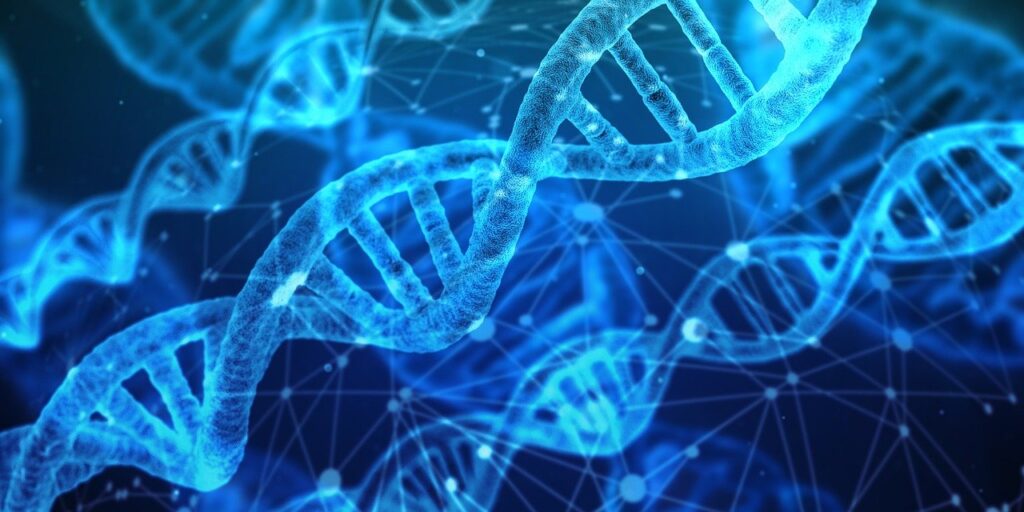Over thousands of years, humans have adapted their bodies to changing terrain, weather, and circumstances. Not only did this “adaptability” make human society flourish, but it also defined our biology. Simply put, “adaptation” is what our bodies do naturally.
In the case of cancer, however, the idea that it might be natural might feel off. But cancer is indeed a natural process of the body adapting. Check out the video version of this article below; the written article contains the links to all research studies and additional info.
What is cancer?
Basically, cancer happens when the DNA within cells mutates and grow uncontrollably. Often times this happens because the cells have to adapt to survive in an unfavourable environment for a long time. Just as our cells work on heating our bodies in cold weather, our cells will adapt to stay alive when our bodies are exposed to irregular environments.
When cells mutate, they are adapting to irregularities that cause them to grow, divide, or repair themselves differently. This adaptation is a natural thing for the cells. But this “natural” thing can sometimes present as tumours or other forms of cancer in us, which eventually damages blood vessels, nerves, and vital organs. When that happens — we die.
Chemotherapy is an aggressive course of treatment that kills all cancerous cells through the use of radiation. And while in many cases this will be essential for the person’s survival, it should also act as a warning to treat our bodies better.
which cancer is the most common?

Breast cancer, lung and bronchus cancer, colon cancer, kidney cancer, prostate cancer, leukaemia, lymphoma, and non-Hodgkin lymphoma are the most common types of cancer. As can be seen, the top two cancers are breast and lung cancer, but that depends on the country. Also, it seems no one gender is spared from reproductive-related cancers like breast or prostate cancer.
Beyond genetic factors, the body often adapts its cells through a process known as carcinogenesis because it was not cared for well enough – in terms of love, breathing well, nutrition, and more.
In an attempt to redefine your reality and limit any mutation from happening, we need to understand what are some long-term habits and choices that may cause the body’s cells to adapt and mutate.
what causes cancer? Genetic Testing for cancer risk

Let me begin with genetics. Those who inherit gene mutations from their family may be more susceptible to cancer. The risk is even more pronounced if they engage in certain behaviours and habits. If you’ve got a family history of cancer, you might want to consider genetic testing for cancer risk.
Even so, only 5 to 10% of cancers are hereditary. The majority of them can be prevented. Therefore, lifestyle behaviour has a greater impact on cancer risk.
what causes cancer? Non-genetic Factors

We’ll see a pattern when we look at the most common cancers. Outside of genetic factors, the pattern illustrates how common it is for our habits and choices to cause our cells to mutate. Here are some lifestyle factors that causes cancer.
Overconsumption of Processed Food & Alcohol
Some habits that have strong links to cancer include eating too much ultra-processed food and consuming too much alcohol.

A 2019 study in the British Medical Journal found that an increase of 10% in ultra-processed food, increased cancer risk by 12%. In another study led by Oxford Population Health, drinking too much alcohol was directly linked to head, neck, oesophagus, liver, colon, and breast cancer. Around the world, 400,000 people die from cancer caused by excessive alcohol consumption.
Both of these consumption excesses make it difficult for the body to rest and remove toxins and free radicals that inadvertently cause cell mutations. It also makes the body work harder to transport blood, oxygen, and nutrients.
Smoking carcinogens
Now for an obvious one. Smoking tobacco is the number one lifestyle factor that causes cancer. As well as lung cancer, smoking is also strongly linked to stomach, pancreas, and kidney cancers. This is due to the chemical carcinogens smokers breathe in every day that binds to their DNA and cause cell mutations.
UV light
Moving on. Getting too much UV light through tanning can lead to skin cancer. This is because we are essentially allowing our skin to burn. Naturally, this also means that the cells in our skin survive and will try their best to adapt and stay alive — mutating.
Should we prolong temporary pleasure & comfort at any cost?

There’s no doubt that behavioural factors play a big role in cancer.
In my experience as an ex-smoker who used to binge drink to deal with overwork and stress, it was my desire to prolong temporary pleasures. And many people certainly believe and do the same. They believe this is what makes life worth living. But is it really so? Can we live our best reality if we prioritize pleasure at all costs?
How to prevent cancer and what does Science say?

If you want to prevent cancer, adopt some new lifestyle habits. Reduce any unhealthy excesses that force your body to adapt and cause cell mutations. Researchers estimate that better choices and habits can prevent 30 to 40% of cancers. This is good news since taking care of your body is usually easy.
So, creating the right conditions for your body could depend on the following four tips that are backed by science.
1. Breathe deeply and perform daily breathing exercises
Breathing deeply gives your body time to recover. It makes sure you’re getting enough oxygen in your blood to impede tumour growth.

Oxygen is such a powerful ally to the human body that researchers at Northeastern University have found that breathing in supplemental oxygen can awaken anti-tumour cells. The increased oxygen consumption limits the inhibitors in the body that protect the tumour, while simultaneously putting anti-tumour cells to work.
To emphasise the importance of breathing, UC San Diego’s Sleep and Cancer Symposium found a link between obstructive sleep apnoea and cancer. Sleep apnoea can reduce oxygen levels sporadically, which promotes tumour growth.
So consider doing daily breathing exercises.
As an added benefit, breathing exercises reduce stress and anxiety, which can prevent the body from removing free radicals that cause mutations. In an extreme example, researchers found that lung cancer patients who practised morning breathing exercises lived significantly longer because they were able to cope with intense stress, anxiety, and depression.
MEDITATION AID LOWERS BLOOD PRESSURE
Guided Tone Therapy
With 3 mins of use, a customer with medication-resistant high blood pressure and anxiety experienced a drop of over 20 systolic and 12 diastolic points.
2. Watch what you eat and how you eat
Nutrition is key to staying healthy. And it boils down to not overeating, limiting certain types of foods (including ultra-processed foods), and eating more healthy foods.
Eat 70 – 80% of your daily needs

To maintain your weight and reduce cancer growth, researchers recommend eating 70 to 80% of your daily caloric needs, while still getting essential vitamins and nutrients. Animals and humans have been found to live longer and have a reduction in tumours and cancers according to different studies by eating slightly lesser.
Limit ultra-processed foods & drinks
As for foods that have strong links to cancer — avoid and limit ultra-processed foods. This includes processed meats such as pastrami, pepperoni, salami, and even bacon; and energy-dense foods with added sugar and fat, like doughnuts, candy, fizzy drinks, and chips.
Even pre-prepared frozen dishes are highly processed with emulsifiers and additives to improve their appearance and taste.
Reduce red meat
It would also be good to reduce red meat (like beef, lamb, and pork) to no more than three portions each week. That’s around 300 to 500 grams (12 to 18 ounces) of cooked weight. After all, numerous studies have linked red meat to colorectal cancer.
Eat more whole grains, fruits & vegetables
Now, just as some foods can cause tumours, others can reduce the risk of cancers.
Wholegrains and fibre, for example, can reduce the chance of bowel cancer, as they can help assist in metabolic activities. Switching white bread, pasta, and rice to their whole-grain versions can actually be the easiest way of reducing the chances of bowel cancer.
Plus, around 128 studies found that eating more fruits and vegetables protected people from overall cancer risk. Lastly, introducing flaxseed into your diet can help reduce and suppress existing tumour growth.
The key here is to enjoy food in moderation rather than being obsessively restrictive.
Save on groceries, SNAP-eligible
Get Healthy Groceries, Free Delivery
Amazon Fresh offers free 2-hour delivery on a complete grocery selection. Even if you’re government assistance, this is a great choice to get fresh and whole foods.
Disclosure: We earn a commission from qualifying purchases. But this doesn’t affect the quality of our recommendations.
3. Sleep at least 7 to 8 hours consistently
Sleep deprivation not only affects your productivity during the day but also increases your risk of tumours and cancers.

In a long-term study by the University of Potsdam, following numerous participants over several years, people who slept less than 6 hours a day had a much higher stroke and cancer risk than those who slept 7 to 8 hours. This is supported by other studies that found people who had fewer than 6 hours of sleep had higher risks of developing colorectal adenomas and stomach cancer.
The bottom line here is to still enjoy your life. But get at least 7 to 8 hours of sleep consistently. After all, sleep allows your body to restore itself and prevent cell mutations.
4. Reducing the risk of viral infections
Cancers can be caused by viral infections, and liver cancer is one of the most common ones.

The book, Viruses and Human Cancer, states that around 10% of worldwide cancers are linked to viral infections. Carcinogenesis (or the mutation of normal cells into cancer cells) has been linked to viral infections like Hepatitis B and C, as well as sexually transmitted viruses like HPV and HIV.
Avoiding these can be relatively easy as practising safe sex and getting preventive medical treatment in time. Enjoy life but love yourself enough for your body to love you.
The Bottom Line
Looking at why our cells adapt (and mutate into cancer) can unlock a whole realm of possibilities and healing. This is why you must take care of yourself and always search for answers by listening to your body. Redefine your reality and live your best life through moderation and balance.
Redefine your reality & life
Whether it’s for guided meditation or better sleep, check out our store.


